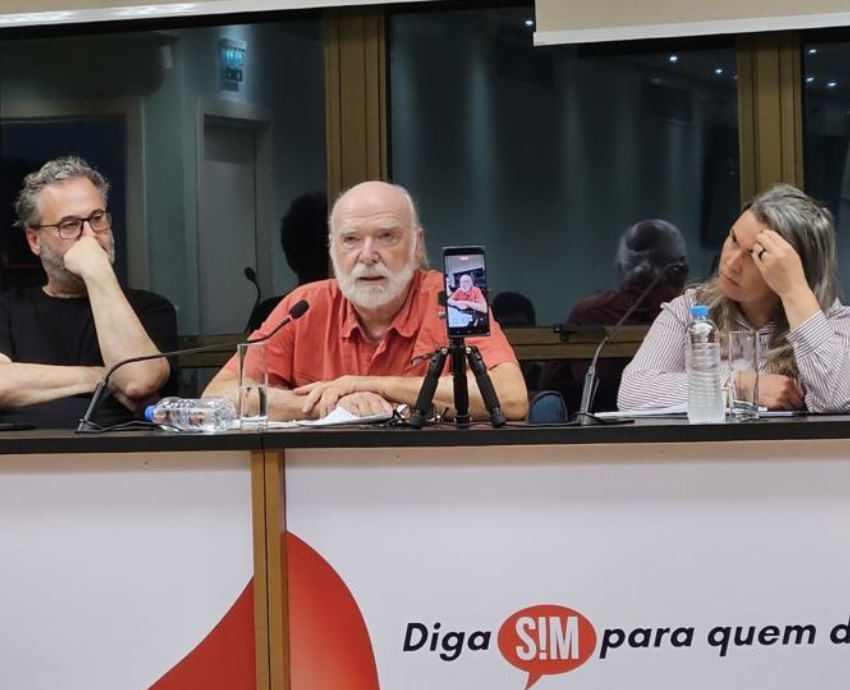
A preparatory meeting for the First International Antifascist Conference, which will take place in Porto Alegre, Brazil, in March next year, was hosted by the conference organising committee in the host city, on September 23. The meeting brought together parties, social movements, trade unions and activists committed to halting the advance of the far right in Brazil and around the world.
Originally scheduled to be held in May last year, the conference was postponed after the state of Rio Grande do Sul, of which Porto Alegre is the capital, experienced the worst flood in its history. Back then, representatives from 31 countries across 6 continents were set to attend.
Almost two years later, the initiating organisations, which include the Socialism and Liberty Party (PSOL), the Workers’ Party (PT), and the Communist Party of Brazil (PCdoB) in Rio Grande do Sul, believe Porto Alegre is once again ready to host the event.
Belgian historian Éric Toussaint, a reference point of the anti-globalisation movement and conference supporter, set the international tone for the initiative. In his speech, Toussaint reviewed the history of the World Social Forum, first held in Porto Alegre in 2001, and issued a warning about the current situation.
“Big capital has more or less opted for the far right to defeat the working class, which does not pose the same threat as it did in the 1930s, but still holds on to some of the social gains it has won. Capital wants to definitively destroy those gains and impose a brutal increase in its rate of profits.”
For Toussaint, unity between the left and progressive camp is the only way to resist neo-fascism. The historian cited recent victories, such as Luiz Inacio “Lula” da Silva’s presidential election win in Brazil in 2022 and the New Popular Front’s victory in last year’s French parliamentary elections, as examples of how collective mobilisation can curb the far right. “When left-wing forces unite, there are possibilities of countering the far-right offensive,” he emphasised.
Toussaint argued the Porto Alegre conference has to be a pluralistic space, bringing together everyone — from trade unions and left-wing parties to feminist, anti-racist, environmental, indigenous, and LGBTIQ movements. Anti-fascism must unite all these struggles, he said.
“The anti-fascist struggle encompasses many themes: rejecting the genocide in Gaza, denouncing climate change denial, resisting attacks on the rights of women and the LGBTQI+ community, and fighting racism, homophobia and increased military spending,” he said.
Unity and resistance
Luciana Genro, a PSOL state MP in Rio Grande do Sul, reinforced the importance of Porto Alegre as a symbol of this international coordination. “For the first time in our history, Brazil has successfully brought to justice and convicted a former president for his involvement in an attempted coup d’état. This is an important democratic victory.
“But at the same time, we are experiencing imperialist attacks, from figures such as [United States President Donald] Trump, who has even sought to interfere in our legal sovereignty. That is why we need to renew the forces of the left and provide mass responses, through mobilisation and struggle,” she stated.
Fabiano, a representative of Sindijus, a union covering workers in the state’s judiciary, said the international situation exposes the gravity of the situation: “Trump has issued a statement deeming any antifa [anti-fascist] movement terrorist. The gravity of what we are experiencing is enormous; it demands unity and overcoming differences, because the future of humanity is at stake.”
Anti-fascist Red Column member Paula argued the anti-fascist struggle needs to be connected to local community battles and internationalist solidarity. “Here in Porto Alegre, communities such as Quilombo do Areal are under direct attack from large corporations such as Zaffari. Just like in Gaza or Venezuela, capital destroys lives and communities. Anti-fascism must be at the forefront of these struggles and of international class solidarity,” she argued.
Graziela Machado Palma, vice president of Sindisaúde-RS, which covers state public health workers, highlighted that resistance is also occurring in the workplace. “We are going through a very difficult period at Grupo Hospitalar Conceição. The board has been systematically attacking workers … It is crucial that we discuss macro-level issues, but also look at what is happening in our ranks, because it is there that we feel the direct effects of neoliberalism and fascism,” she noted.
Porto Alegre as an international reference point
The preparatory meeting made it clear that the conference will be a pluralistic and inclusive space, open to political parties, trade unions, youth, feminist, anti-racist, environmental, LGBTIQ and indigenous peoples’ movements.
Toussaint emphasised that “youth must be protagonists” in the conference and that it had to combine broad plenary sessions with self-organised workshops, as well as facilitating online participation to involve organisations from other continents.
Porto Alegre, which once hosted the birth of the World Social Forum, is preparing to return to the centre of global progressive struggles. The call is clear: to build a counteroffensive capable of halting the advance of fascism and paving the way for a future based on solidarity, democracy and social justice.
[Tatiana Py Dutra is a journalist for Revista Movimento, where a version of this article was first published in Portuguese. The article was translated by Federico Fuentes, with some additional information about the conference added for context.]